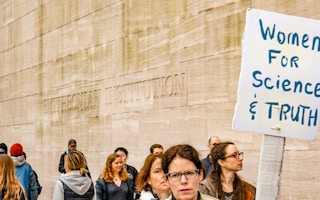Harassment is no stranger to the reporters, researchers and policymakers who work on climate change, but it is particularly severe for the women in those fields.
Canadian environment minister Catherine McKenna was labeled “climate Barbie” by the right-wing political blog The Rebel Media. Kait Parker of the Weather Channel suffered attacks from Breitbart News, which dismissed her forceful and lucid explanation of climate science as an “argument from a pretty girl.” Emily Atkin, who covers climate and energy for The New Republic, also has endured sexist barbs from Breitbart, which said she had “kitty claws,” and Rush Limbaugh, who called her an “infobabe.” In similar fashion, climate scientist Katharine Hayhoe earned the moniker “climate babe” from Limbaugh.
Certainly, sexist attacks are not unique to climate science, journalism or advocacy, but research into public understanding of climate change reveals an important link between sexism and climate denial — support for the existing social hierarchy.
Often, in studying how humans arrive at their values, attitudes and beliefs, social scientists will ask people about their views of hierarchy. Do they believe that some groups should have more power and influence than others? Or, do they believe that power and influence should be broadly shared? Research shows that men who value hierarchy are more likely to downplay the risks of climate change and more likely to hold sexist views.
Tests of hierarchical leanings ask respondents to rate how much they agree with statements like, “Some groups of people are simply inferior to other groups,” and, “Some groups of people must be kept in their place.”
Tests of “hostile sexism”— defined as antagonistic attitudes toward women — ask respondents to rate how much they agree with statements like, “Women seek to gain power by getting control over men,” and, “Many women get a kick out of teasing men by seeming sexually available and then refusing male advances.” Research shows that men who agree with the the first set of statements are likely to agree with the second.
“
Battles about climate change and gender relations are different fronts in the culture war among social hierarchs, egalitarians and individualists.
Brendon Swedlow, political scientist, Northern Illinois University
Likewise, studies find that men with hierarchical leanings — who disagree with statements like, “We need to markedly reduce inequalities between the rich and the poor, whites and people of color, and men and women” — are also likely to say that climate change poses little risk to human health, safety and prosperity.
This is not to say that every sexist denies climate change or that every climate denier is sexist. It is merely to say that men with hierarchical leanings are inclined toward both sexism and climate denial, and this fits with a shameful pattern of men hurling sexist insults at women who work on climate change.
Social scientists interviewed for this story cautioned against drawing any firm conclusions. There is no research, for example, showing that men who deny climate change are more likely to be sexist than men who don’t. More work is needed to evaluate this link. It simply may be the case that many men oppose rules and regulations that would change a system that largely benefits them. What is clear, however, is that both sexism and climate denial are consistent with a hierarchical view of the world.
“Beliefs about the occurrence and causes of climate change and about how men and women should relate to each other are linked through socialisation in rival political subcultures,” said Brendon Swedlow, a political scientist at Northern Illinois University, in an interview. “Battles about climate change and gender relations are different fronts in the culture war among social hierarchs, egalitarians and individualists.”
As cognitive linguist George Lakoff writes, hierachs believe that, “in a well-ordered world, there should be (and traditionally has been) a moral hierarchy in which those who have traditionally dominated should dominate.” In this hierarchy, he explains, it is “Man above Nature, the Disciplined (Strong) above the Undisciplined (Weak), the Rich above the Poor… Men above women, Whites above Nonwhites, Christians above nonChristians, Straights above Gays.”
In this view, nature is a resource to be exploited by man. When experts urge governments to regulate industry in order to protect nature, they are subverting the natural order — all the more so when those experts are female. Tree huggers and uppity women both threaten the existing male-dominated hierarchy.
For advocates, this should serve as another reminder that the climate crisis is tightly bound with other urgent issues. Just as societies cannot effectively deal with the carbon crisis without addressing racism, xenophobia and economic inequality, they cannot dispense with climate denial without tackling pervasive sexism.
This story was published with permission from NexusMedia.

















